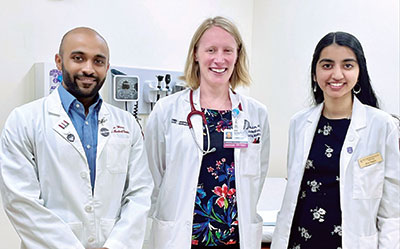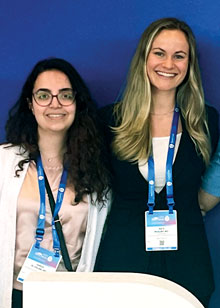Medical Student–Run Clinic Supports Those Seeking Asylum
Abstract
Students at New York Medical College operate the Center for Human Rights, which connects individuals seeking asylum with physicians who provide medical evaluations. For some students, the work has inspired them to pursue psychiatry.
During her most recent medical evaluation of an individual seeking asylum in the United States, Rebecca Martin, M.D., conducted the interview while the client was waiting for a bus. “It was running late,” Martin said. “We were really worried we were going to miss our window and not be able to do the evaluation, and then have to reschedule the whole thing with the eight people who were involved.”
But luckily Martin was able to conduct the evaluation, thanks in no small part to the diligent efforts of the students who run the Center for Human Rights at New York Medical College (NYMC). Martin is the center’s faculty advisor and clinical associate professor and palliative medicine consultant at Westchester Medical Center, a hospital affiliated with NYMC.

Medical students Rahim Hirani (left) and Kavya Tangella (right) are executive directors of the Center for Human Rights at New York Medical College. They are among the students who keep the center running and support medical and psychological evaluations that Rebecca Martin, M.D. (center) and others conduct for people seeking asylum.
The NYMC Center for Human Rights is one of 19 Physicians for Human Rights programs across the country. Physicians for Human Rights is a nonprofit organization that advocates for human rights through medicine and science. The Center for Human Rights is entirely run by students who help physicians like Martin conduct pro-bono forensic psychological and medical evaluations for people seeking asylum, as well as for those who are victims of sex and labor trafficking.
These student-run programs were largely started in direct response to the migrant crisis in New York City and elsewhere across the country, explained Rahim Hirani, a third-year medical student at NYMC. Hirani and Kavya Tangella, a second-year medical student at NYMC, are executive directors of the center, which began in 2017.
Sarah El Halabi, M.D., M.S., APA’s resident-fellow member trustee-elect, learned about the center during grand rounds and was inspired. She is a PGY-3 at Westchester Medical Center. “Hearing how these students are trying to be helpful to people who have absolutely no resources was immediately moving to me as a citizen of the world,” she said.
Students Devote Time to Connecting Asylum Seekers, Physicians
Martin emphasized the vital role that the students play in the center’s operations. “There is no way that I, as a physician evaluator, could do this if it was not without the support of the students,” she said.
The students are responsible for administrative tasks and coordinating times with lawyers, physicians, and asylum seekers whose schedules may rarely overlap. When organizations or lawyers reach out to the center seeking an evaluation, the students search their network for an available physician who can conduct the interview within the timeline, which is usually dictated by court hearings.
The students sit in on the evaluations, learning from the physicians how best to conduct such interviews while taking diligent notes. They then write up affidavits (sometimes as long as 10, single-spaced pages, Martin said) and work with the physician to edit.
The evaluations are designed to corroborate the client’s claims of persecution and abuse, which helps them to secure asylum in the United States. They involve learning about clients’ social, educational, or work histories, their experiences of ill treatment, the injuries they may have experienced, and what led them to flee their countries of origin. In addition to the traumas clients may have already outlined with their lawyers, Martin said she typically talks with the clients about their early life stressors, as well as any disabilities, injuries, or diagnoses of mental or substance use disorders they may have.
The clients often have incredibly harrowing stories to share. Many have experienced gang violence, domestic violence, or other forms of extensive abuse in their countries of origin, Martin said. Further, their experiences of crossing the American border often include still more traumatizing experiences, as well.

Sarah El Halabi, M.D., M.S. (left), and Kate Morant, M.D. (right), are photographed at APA’s 2023 Annal Meeting in San Francisco. Morant and colleagues will be presenting at APA’s 2024 meeting on the student-run Center for Human Rights and how participation in such programs may encourage students to pursue psychiatry.
Psychological and medical evaluations can make a massive difference to clients in securing them asylum in the United States. According to Physicians for Human Rights, 90% of asylum requests that include an evaluation performed by a volunteer with the organization are successful, compared with a national average of about 30%.
“My work with the clinic and learning to write objective affidavits has influenced my decision to pursue a career in forensic psychiatry,” said Kate Morant, M.D., a PGY-3 psychiatry resident at Westchester Medical Center. She will be presenting on the clinic with Tangella and faculty supervisor and psychiatrist Lidia Klepacz, M.D., at APA’s 2024 Annual Meeting in New York. The session will explore how such clinics increase trainee interest in working with marginalized populations, potentially through forensic psychiatry.
The Biggest Challenge: Not Enough Physicians
Tangella and Hirani said that the greatest challenges they experience in doing this work is the lack of physicians to conduct the evaluations. From April to September 2023, the clinic received 40 requests for evaluations, but 11 had to be rejected because physicians weren’t available.
Martin encouraged her fellow physicians to volunteer their time. The work does not have a strict time commitment, and evaluations can be done whenever the physician has availability. It also does not require malpractice insurance because the physician is not treating the client.
Tangella and Hirani said their experiences with the program have influenced their plans for the future. Hirani isn’t yet certain what he wants his career to look like exactly. “But I do know this for sure: Whatever I do, I will continue to be involved in the kind of work this clinic does,” he said.
Tangella said sitting in on the evaluations inspired her to go into psychiatry. “Being part of an evaluation was eye-opening and really impactful for me,” she said. “The first two years of medical school can feel really monotonous and like you’re not doing much, but this work gives us purpose and helps us feel as though we’re making a difference.” ■



